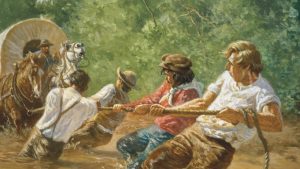Some years ago, I was asked to give a talk at a stake conference. I was a Relief Society president at the time. I was asked to speak on welfare principles and was given quotes from general authorities regarding principles of welfare. I was to select one for my remarks.
“The principle of self-reliance or personal independence is fundamental to the happy life . . . Self-reliance has application to the spiritual and to the emotional . . . Can we not see that the same principle applies to inspiration and revelation, the solving of problems, to counsel, and to guidance? We need to have a source of it stored in every home” (Boyd K. Packer, “Solving Emotional Problems in the Lord’s Own Way,” April 1978).
I pondered this quote by Elder Packer and chose to expand on the need for emotional self-reliance. The following post is adapted from that talk.
What is Stored in Your Heart?
 What do you have stored in your food storage pantry? What is stored in your emotional storehouse?—do you have a year’s supply? A month? A few minutes? One of the things I’ve learned about food storage lately is that your personal food storage is considered as part of the bishops’ storehouse. In the event of a disaster, you may be asked to donate, to share what you have. The same thing goes for your emotional storage. Even when your life is going smoothly, you may be called on to share your emotional reserves with someone in crisis.
What do you have stored in your food storage pantry? What is stored in your emotional storehouse?—do you have a year’s supply? A month? A few minutes? One of the things I’ve learned about food storage lately is that your personal food storage is considered as part of the bishops’ storehouse. In the event of a disaster, you may be asked to donate, to share what you have. The same thing goes for your emotional storage. Even when your life is going smoothly, you may be called on to share your emotional reserves with someone in crisis.
“Be prepared, self-reliant, and independent. Times of plenty are times to live providently and lay up in store. Times of scarcity are times to live frugally and draw on those stores” (Keith B. McMullin, “Come to Zion! Come to Zion!” October 2002).
Raise Your Joys and Triumphs High
I remember when I was a young single mother. At that time, the LDS Singles were referred to as “Special Interest” and were told we were “of special interest” to the Lord. We had a conference up on Mount Saint Michael in Spokane, and its theme was taken from the lyrics of one of our hymns: “Raise your joys and triumphs high.” We were told that the Lord was mindful of us and that He was pleased that we were doing what we needed to do to get our lives in order. They said that even though times were perhaps difficult for us right now, the day would come when our children would rise up and call us “blessed” because of the efforts we were making to provide them with a gospel-centered home.
Then the keynote speaker said something that comes back to my heart and mind today. He told us that we were the ones who would be providing a valuable resource to the Church because of the experiences we were having. He said every person in the Church would eventually be a member of the ranks of “Special Interest”—or they’d be dead. He said, “If I die, my wife will be a ‘Special Interest’ and if she dies, I will be. I have to tell you that I wouldn’t have any idea what to do. I’d have to come to you to help me know how to deal with that level of change in my life—my loneliness, my grief, my adjustments to living alone.”
He told us we were in training to gain the emotional resiliency, knowledge, and compassion that would be so greatly needed in our world in the closing scenes of this dispensation.
So, take a moment to sense the condition of your heart. Look around you. How well stocked is your emotional pantry? Can you contribute to another’s peace of mind in times of crisis? Or will you be the one in crisis?
Zion’s Camp
Many of us are familiar with the trek that Joseph Smith and several leadership brethren went on in the early days of the Church. During this time, they headed out from Kirtland to go to Missouri where so many of the Saints were suffering hardships. Just as they were at the shores of the Missouri River, where they were so close to what they thought was the end of their journey, Joseph announced that they had completed what they needed to do—they were to head back home.
As we look back at Church history, we see that this was an opportunity for the Lord to test the strength, commitment, and testimonies of His leaders. This was their leadership training camp to prepare them to be able to lead the Saints to the West. Many continued on as great leaders in Utah. However, many others were unable to overcome their pride, anger, and rebellion. This was an opportunity for them to reveal themselves and their level of commitment to the cause of Zion.
Today, we too have our Zion’s Camp—our opportunity to reveal what we are made of. This is our opportunity to declare who we are and what our commitment is to the Lord. Are we tired? Weary? Discouraged? Disheartened? Absolutely! Are we willing to move past that place and do what needs to be done for the cause of Zion? What doesn’t kill us will strengthen us.
Strength and Leadership Needed in a World in Chaos
Years ago, in the days when I first became aware of the survival books being circulated by some Church members, I remember reading a book entitled Wheat for Man. There was a story in the back of that book that was a simulation of the things that might happen in a natural disaster of some kind. It talked about the importance of being emotionally self-reliant. The qualities of emotional leadership that allow you to be calm, use critical thinking skills, and have the capacity to formulate and execute a plan of action would make you a respected and capable leader who people in crisis and transition would naturally be drawn to for help.
I love the wisdom of Elder Neal A. Maxwell as illustrated by this paraphrased quote:
The real accomplishment is to drink from the “bitter cup” without becoming bitter. Rather than simply passing through trials, we must allow trials to pass through us in ways that sanctify us. We know we are sanctified by the trial when our empathy for others is enriched and everlasting. The suffering loses its purpose when all we do is complain.”
Elder Maxwell speaks further regarding the purpose of life experiences:
“Life is carefully designed to produce for us, if we are willing, a harvest of relevant and portable experience. But there is such a short growing season! The fields must be worked intensively amid droughts, late springs, and early frosts. For the disobedient and despairing who refuse to plant, plow, or harvest, theirs is not simply a “winter of discontent” but a despair for all seasons. The indifferent and lackluster who work only on the surface of life will harvest little” (Neal A. Maxwell, “Enduring Well,” April 1999).
Life Experiences are Opportunities to Gain Wisdom
As I now ponder my life, I look back at a dysfunctional, abusive, broken home that eventually took me and my siblings to foster care. As I look at the lives of my brothers and sister, I see the hardship of early marriages producing children and ending in divorce. I see prison terms, alcohol and drug abuse, sexual abuse, cancer, heart attacks, death of both parents… And on and on it goes.
 AND, I can tell you that through all those experiences, to my knowledge, none of our family ever experienced more than mild hunger pangs, none of us ever were without clothing, shelter, medical assistance, entertainment, sports, nor companionship. Only one of my brothers experienced an extended time without freedom as he paid his debts to society. The point I’m making is that even in the severely dysfunctional environment that was my introduction to this world, the basic needs of life were provided for in some fashion.
AND, I can tell you that through all those experiences, to my knowledge, none of our family ever experienced more than mild hunger pangs, none of us ever were without clothing, shelter, medical assistance, entertainment, sports, nor companionship. Only one of my brothers experienced an extended time without freedom as he paid his debts to society. The point I’m making is that even in the severely dysfunctional environment that was my introduction to this world, the basic needs of life were provided for in some fashion.
The one fundamental need that was missing—the one prized possession that we went without for so long and the one ingredient that I notice is missing today from even the homes of affluent and active Church members—is the capacity for spiritual and emotional self-reliance that Brother Packer indicates must be stored in every home and the one which I wish to address.
I can attest to the value of being emotionally resilient and the importance of a measure of self-mastery. Some time ago, I was asked how I got to be so wise. My response? “It is wisdom borne of pain.”
I have two sons who have been tempered in the fires of refinement. Their stories are theirs to tell, but what I will share with you is something that happened in our ward when they were in high school. At that time, I was the seminary teacher. I remember a wise Young Men’s president who had a profound impact on my sons, as well as many other youth in our ward. He said, “I am impressed that many of our youth have survived more devastation in their young lives than I ever expect to see in my entire lifetime. I stand in awe and in humility in their shadows. They will one day be leaders in this Church.”
I have watched these youth grow up, and they now have children and grandchildren of their own. I envy their wards and stakes. I know they have leaders with compassion, mercy, strength, and commitment. They are leaders who have looked down the barrel of life’s adversity. They know how to comfort those who stand in need of comfort, to lift the hands which hang down, and to strengthen the feeble knees. They know how to love.
When Ye Are Prepared…
The Lord expects us to be prepared in every needful thing to be standing at life’s physical and emotional floodgates, at the quaking foundations, in the fiery furnaces of adversity. We are the sentinels who will stand as the ones giving comfort. We are the ones who are called to be soothing the crying and the dying. We are the ones with the fullness of the gospel, the companionship of the Holy Ghost, the ones with the knowledge of the plan of salvation. We know how to serve full-heartedly and full-souled.
Do I have adversity in my life today? Of course, just like you do. Are they painful? Yes. Are they difficult? Some more than others. Are they uncomfortable? Absolutely. Inconvenient? Wearisome? Oh yes! They are all of those things, depending on the situation. And, most importantly—they are manageable.
The scriptures invite us to be grateful for all things that the Lord sees fit to bring into our lives. We’re told that whom He loves, He tests. Tests? Yes. He also gives us the way to succeed, to overcome whatever besets us. Here are just a few important things I know about my Heavenly Father and about what He will and will not do:
- He will not give me more than I can bear
- He will not save me from the natural consequences of my choices
- He will not force me to obey
- He will not abandon me
- He will not change His mind about me
- He endowed me with a strong body, a strong spirit, an unconquerable will to return home
- He comforts me
- He strengthens me
- He LOVES me so much that He gave me the gift of His Only Begotten Son so I can risk to learn wisdom from that which I experience. I can access His divine help as I humble myself to let go of that which I cannot do and ask for His hand of mercy to be upon me.
- The Atonement not only heals me from the sins I have committed; it also heals me from the pain caused by the sins of others. Most precious to me is that the Atonement will also heal the pain I have caused others.
What a blessing it is for us to be experiencing our own Zion’s camp; our own “leadership training” as we become strengthened by allowing our trials to go through us. Where will you be when the next disaster strikes, whether it be on a world scale, a community, or neighborhood scale—or within the walls of your own home? Will you be the comforter or the comforted?
Now is the time to prepare to be emotionally resilient—to be on the side of helping others with your quiet strength, your resilient, uplifting heart full of possibilities and options for how to deal with whatever comes in the closing scenes of this dispensation. Truly, quiet resilience is the nature of being open to the promptings of the Spirit.
 It is important to create a personal vision and purpose statement to help you focus on the path in life that you choose to pursue. As you learn what you need to know and what you need to know how to do, you will refine the words until they settle into something that you feel is in alignment with your heart.
It is important to create a personal vision and purpose statement to help you focus on the path in life that you choose to pursue. As you learn what you need to know and what you need to know how to do, you will refine the words until they settle into something that you feel is in alignment with your heart.
In closing, I share with you my personal vision and purpose statement:
I am love.
Noble, expressive, and joyful –
by nature and by choice.
My purpose is to align my will to God’s will,
reflecting wisdom, clarity, courage, and grace.
What is your purpose?
Sonja lives with her husband, Dale, on Anderson Island, Washington. She and her husband are Church Service Missionaries serving in the Addiction Recovery Program, focusing on pornography and sex addiction. She is also a certified life coach and teaches “Life Skills for Emotional Self-Mastery” in her stake twice a month. She does not teach you only to process something traumatic done to you in the past; rather, she helps you learn to feel it, heal it, and LET GO of whatever you still do to yourself and to others in order to cope with what was done to you in the past.








I have read your post and it is very thorough.You will do well in this .
Thank you. I’m so excited to have been accepted as a contributor. I will be posting a new blog every other week.